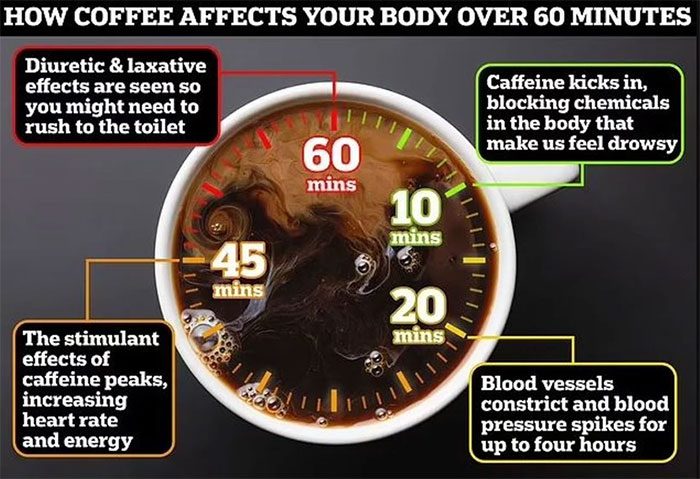The impact of coffee on the body can be felt quite distinctly right after consumption. So, how exactly do our internal organs react when we consume coffee?
For many of us, drinking a cup of coffee in the morning is an indispensable habit that enhances focus and provides energy for a productive day at work.
The impact of coffee on the body can be felt very clearly soon after drinking. So, how do our internal organs respond to coffee? MailOnline has analyzed this process in detail.

The process of coffee affecting your body. (Source: Dailymail)
After 10 Minutes
Ten minutes after your first sip of coffee, your blood pressure and heart rate begin to rise, as caffeine starts to take effect.
Dr. Duane Mellor from the British Nutrition Association states that caffeine will start to appear in the bloodstream 10 minutes after consuming coffee. This reflects how quickly caffeine is absorbed into the blood.
As the caffeine in coffee is absorbed, that’s when you will feel a noticeable boost in energy. However, the truth is that caffeine does not provide energy; rather, it works by preventing your body from interacting with adenosine, a neurotransmitter in the brain that causes fatigue.
After 20 Minutes
You will feel more alert, lively, and focused. Tasks and problem-solving will also become easier.
Dr. Mellor explains that caffeine blocks the body’s adenosine receptors, not only promoting alertness but also causing an increase in blood pressure within half an hour after drinking coffee—and this effect continues for about 4 hours afterward.

You will feel more alert, lively, and focused after 20 minutes of drinking coffee. (Source: Shutterstock)
The spike in blood pressure is due to caffeine constricting your blood vessels, thus increasing your heart rate.
Although this is temporary, the National Health Service (NHS) warns that drinking more than 4 cups of coffee a day can lead to long-term increases in blood pressure.
After 45 Minutes
Dr. Mellor notes that the effects of caffeine on the body peak after 45 minutes.
At this time, the levels of serotonin (the happiness hormone) in the body increase. This will enhance motor function in the brain, thereby helping muscles work more effectively. You will feel energized and perform better.
However, this does not mean you should drink as much coffee as possible. Consuming too much caffeine can lead to feelings of restlessness or anxiety instead of helping you focus.
The NHS guidelines state that about 400mg of caffeine per day is safe for adults, equivalent to 4 regular cups of coffee.
For pregnant women, it is recommended to limit consumption to a maximum of 2 cups of coffee per day. The recommended limit for teenagers is 1 cup of coffee per day.
After 60 Minutes
After caffeine has stimulated alertness, you may notice its side effects after about an hour.
Dr. Mellor explains that once caffeine enters the bloodstream, it starts to have what experts refer to as a diuretic effect.
This means that if you drink coffee, you may need to urinate more frequently than usual.

If you drink coffee, you may need to urinate more than usual. (Source: iStock)
According to the NHS, when you drink coffee, the caffeine in the beverage inhibits the production of antidiuretic hormone (ADH), which typically helps regulate the amount of water in your body.
This results in the kidneys being unable to reabsorb water and increases urine output.
You also do not need to worry about the potential for dehydration due to the diuretic effect of caffeine.
Research shows that only when you consume more than 500mg of caffeine (over 5 cups of coffee) per day does the risk of mild dehydration increase.
The NHS also states that moderate coffee consumption can help hydrate the body similarly to water and fruit juice.
After 90 Minutes and Beyond
Dr. Mellor notes that the time it takes for caffeine to metabolize varies from person to person, but for most people, 1-2 hours after drinking coffee, the stimulating effects of alertness and the diuretic effects begin to fade.
In the hours that follow, some individuals may feel lethargic again, similar to how they felt before drinking coffee.
However, just because you feel the effects of caffeine diminishing does not mean it has completely left your body.
Six hours after caffeine consumption, half of it remains in your body. Researchers at the Sleep Foundation state that caffeine can stay in your system for up to 12 hours.
Therefore, many sleep experts recommend that you avoid caffeine for at least 8 hours before bedtime so it does not interfere with your sleep; meaning it is best to avoid drinking coffee in the afternoon.



















































